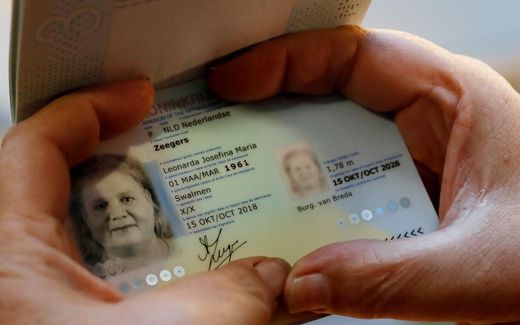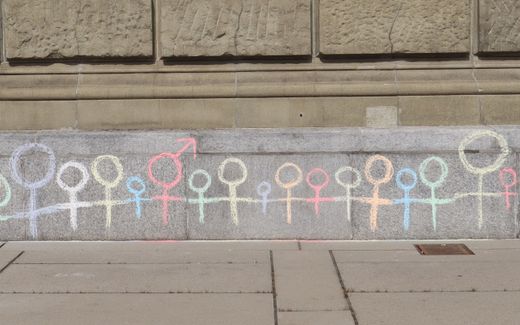Dutch doctor: Consequences Transgender law remain unclear

Photo Unsplash, James A. Molnar
Western Europe
Around Christmas time, a friend shared with Dr Hanneke Kouwenberg the developments she noticed in the field of transgender ideology. Since that time, the physician has dived deep into the ins and outs of the proposed Dutch Transgender law. Her friend is still a member of D66, the liberal Dutch political party that is pre-eminently at the forefront of progressive legislation. Kouwenberg is not any longer.
Around Christmas time, a friend shared with Dr Hanneke Kouwenberg the developments she noticed in the field of transgender ideology. Since that time, the physician has dived deep into the ins and outs of the proposed Dutch Transgender law. Her friend is still a member of D66, the liberal Dutch political party that is pre-eminently at the forefront of progressive legislation. Kouwenberg is not any longer.
If the Dutch House of Representatives passes the Transgender law, every Dutch citizen can change the sex written on his or her birth certificate as he or she likes. His or her physical state is not taken into account.

Currently, anyone wanting to change his or her sex legally needs an expert's opinion, written by a doctor or a psychologist. The expert checks whether the person concerned is competent and whether his or her wish for gender reassignment is permanent. The person concerned receives information about the effects and meaning of gender change and an expert checks whether the desire is not the result of a mental disorder. Kouwenberg: "This topic concerns the whole population. Why are the media so silent, and why are the consequences of this new law still unclear?"
Why is the lack of debate on this topic problematic?
"Sex is a biological fact. This is ignored by abolishing the requirement for an expert's opinion. Basically, sex is defined in another way. Objective features are replaced by someone's feelings. It will not lead to problems most of the time, except when sex is relevant. Sex plays a role in domestic violence, sexual violence, demographic analyses like employment rate, in the field of criminology, sports, intimate relationships, and my own field of health care.
Transgender laws in Europe
Between 2014 and 2021, several Western European countries have passed new transgender laws which determine that people can choose their own gender. This is called gender registration, self-identification or self-ID. The Netherlands and some other countries still have to decide about the issue.
Netherlands
The Dutch House of Representatives will soon vote on the new Transgender law; the debate is planned for June (but will probably be postponed until after the summer). In the new law, a statement from an expert is no longer required, and children under 16 will be able to change their legal gender. They do not need parental consent. The Dutch social liberal party D66 has asked to include the option of X in the law as a gender, besides male and female. According to a poll, less than 15 per cent of the Dutch population supports the Transgender law.
In other countries, we see that excesses arise in places where self-identification is applied without guarantees. Examples are rapes in prisons and hospitals, missed diagnoses at the emergency in hospitals, accidents in sports, and problems in communication between health care employees. In contradiction to what is often suggested, there has been no research on the risk of this kind of excesses prior to this proposal. The statement that self-identification does not lead to problems is pertinently untrue."
You raise the issue in Dutch media while you live abroad.
"I grew up in the East of the Netherlands, but currently I live abroad, where I work as a radiologist and nuclear physician. Staying abroad enables me to speak out because I am not easily traceable. Therefore, I know that my career will not be endangered, nor my employer be harassed. If I had lived in the Netherlands, I would probably not have risked this.
People who are critical of gender ideology, like the British philosopher Kathleen Stock, bring up relevant arguments which are medically correct. Yet, they are confronted with much aggression, sometimes even death threats. There are also cases of physical violence against critics."
For a few weeks, Kouwenberg has been active on Twitter. She sends opinion articles to newspapers and magazines and debated the Transgender law on BlackBoxTV. "Ultimately, I am driven by the oath I took as a physician. I swore that I would work to improve health care quality, also under pressure. If sex is subjected to gender identity, a feeling, gender-specific research will be undermined, and we will start to miss diagnoses. Biological sex is relevant in the broad sense of health care. My oath forces me to speak up."
It will not be such a big deal, defenders of the law say.
"Laws are not made for the days on which everyone is reasonable, but for moments of conflict. Everything possible will play up one day. Thinking deeper is not paranoid but prevents misery. I find it negligent that the legislator has not thought through relevant consequences."
According to Kouwenberg, there needs to be good access to information about the Transgender law. She says it needs to become clear what the solutions are for places where sex is relevant. "What do we do with changing rooms, sports, dating apps and health care? We have signed international agreements, such as the Convention of Istanbul, to prevent and fight violence against women and domestic violence. These agreements contain sets of rules that are based on biological characteristics. If self-identification is implemented, the Netherlands will have to reformulate many laws to meet these agreements."
How would you explain the lack of open debate?
"The lack of debate has several reasons. The first is that the Transgender law does not play a role in many people's perceptions. Transgenders form a minority in society. Only once in a while, people hear something of the events that happen. For example, at the end of last year, the College of Human Rights declared that a Dutch sports facility could not prevent a biological male identifying as female, Alexandra Erné, from entering the women's changing room. In fact, the College declared that gender identity is leading, not sex. That is a big thing since the Dutch minister of Domestic Affairs, Kajsa Ollongren, said that the law would not change substantively with the addition of the term gender identity to the General law of equal treatment in 2019. Yet people think that this is an unusual exception. They do not realise the large impact of such a verdict. I know that some Norwegian women avoid changing rooms and change at home for this reason.
A second reason is that the transgender legislation is kept under the radar on purpose. It is known that trans activists use several standard tactics. One of them is avoiding debate. Another one is intimidating opponents or removing coordinated opposing actions from social media, as happened recently on Twitter. A case like this undermines open debate."
To what extent does confusing language play a role?
"A large role. Activists use terms like sex, gender, gender expression and gender identity interchangeably. That way, people become confused. Also, a term like "trans woman" hides the fact that a person is biologically not a woman but a man.
The word gender has more than one meaning. On the one hand, it means sex. In English, the term gender is used interchangeably with biological sex, as the English word sex also means sexual intercourse. The second meaning of the word gender is the role that belongs to being male or female, including clothing and social interaction.
By using the terms interchangeably, confusion arises. Isn't there freedom of gender, people ask. They actually mean: gender expression. Transgender activists shout that gender is free, so one should be able to freely choose his gender. That is okay if they refer to the role that someone plays. But in identification documents, gender means something different. There it talks about biological sex. There the confusion arises because sex is something people are born with. They cannot choose it."
Do Members of Parliament realise the meaning of the Transgender law?
"I know for sure they do not. Everything points in that direction. Maybe that is not strange either because the meaning of the terms is unclear. Jargon has been created to show the facts differently. Only when you are very critical you discover that words get a very different meanings. This is often what goes wrong in the media. Journalists accept the jargon without asking questions."
How is the growing number of transgenders related to the increased openness about transgenderism?
"I do not rule out that the growing number of transgenders is partly explainable by acceptance. But there is also a different reason. The kind of people knocking on the door of gender clinics has changed dramatically over the last 15 years. Earlier, most of these people were men; currently, most of them are teenage girls. The reason for this shift remains unclear. What we do know is that many of them suffer from other psychological problems, such as autism. That fact has consequences for the treatment of these girls. It also means that knowledge about the quality of life of transgenders after hormonal treatment and surgery does not merely apply to these people. Actually, we do not know which treatment is best for them. There is a serious risk of harming these people if we are not critical of this."
Is transgenderism biologically identifiable?
"A transgender has the conviction that he belongs to the other sex. He feels uncomfortable in the body that he received. In former days, this condition fell under transsexuality, categorised as a sexual perversion. In the 70s and 80s of the last century, attempts were made to destigmatise these tendencies, just like homosexuality and paedophilia. Thus, we arrived at the point where people say transsexuality is not a disease or disorder.
This decision is politically motivated, not based on changed medical insights. The UN World Health Organisation removed transgenderism from the list of mental disorders four years ago. It now presents it as a physical condition, just like pregnancy.
There are psychiatrists that strongly disagree. Some of them see transgenderism as a disorder (Body Dysmorphic Disorder); others think it is a delusional disorder. Furthermore, researcher Ray Blanchard states that most men who report to a gender clinic are autogynephilic. That means that these men experience sexual excitement by imagining themselves to be female.
There is no biological explanation for transgenderism. There is a difference between male and female brains, but this does not become apparent until puberty. Classical transgenders already notice uncomfortableness with their sex when they are toddlers.
At the moment, the belief that a male brain can be caught in the wrong body has become dominant. People who have a different opinion are met with aggression."
Do you trust the Dutch gender care to provide good care?
"A critical diagnosis has become harder because clients know what to say to get what they want. They often researched this on the internet. In addition, trans activists desire total autonomy and want to abolish diagnoses. This so-called "informed consent" has already become practice in the United States. When a young American tells his doctor that he wants a gender transition, the physician cannot prevent him from doing so. He can only point out the costs and benefits of the treatment. That is an unwanted situation. Treating people without diagnoses is against the medical principle that harm should not be done.
If the proposed Transgender law is passed, someone can change his name and gender in his passport and report to a gender clinic. Then it becomes very hard to keep someone from undergoing gender reassignment. The question then arises whether this is a medical treatment or not."
How do you deal with transgenders in daily life?
"The social situation, the judicial situation and the medical reality are three different things. Just look at the Dutch YouTuber Nikkie de Jager from the channel NikkiTutorials. Biologically, she is male, but there won't be many people who experience her as male or treat her that way. That is the acceptance I wish all transgenders would get. But the medical reality that she is not equal to a woman should not be undermined. The new Transgender law ignores that aspect.
What do we think when people with a male body want to go to female prisons or desire to be treated at the female department of the hospital? The large majority of transgenders do not undergo surgery. It is the task of the Members of Parliament to weigh the interests of the whole of the population. In the case of a full transition, so after surgery, a woman may enter the women's changing room, in my opinion. But that does not apply to someone with a male genital. That is the boundary."
This article was translated by CNE.news and published earlier by Dutch daily Reformatorisch Dagblad on May 11, 2022
Related Articles






